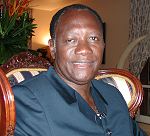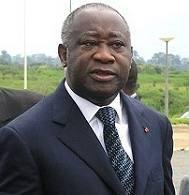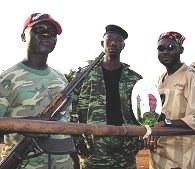Related Research Articles

Ivory Coast, officially the Republic of Côte d'Ivoire, also known as Côte d'Ivoire, is a country on the southern coast of West Africa. Its capital is Yamoussoukro, in the centre of the country, while its largest city and economic centre is the port city of Abidjan. It borders Guinea to the northwest, Liberia to the west, Mali to the northwest, Burkina Faso to the northeast, Ghana to the east, and the Gulf of Guinea to the south. Its official language is French, and indigenous languages are also widely used, including Bété, Baoulé, Dioula, Dan, Anyin, and Cebaara Senufo. In total, there are around 78 different languages spoken in Ivory Coast. The country has a religiously diverse population, including numerous followers of Islam, Christianity, and traditional faiths like Animism.
The First Ivorian Civil War was a civil conflict in the Ivory Coast that began with a military rebellion on 19 September 2002 and ended with a peace agreement on 4 March 2007. The conflict pitted the government of Ivorian President Laurent Gbagbo against a domestic insurgency led by the New Forces of Ivory Coast. Following the war, a second civil war (2010–2011) would begin over the results of the 2010 Ivorian presidential election.

The United Nations Operation in Côte d'Ivoire (UNOCI) was a UN-NATO peacekeeping mission in Ivory Coast whose objective was "to facilitate the implementation by the Ivorian parties of the peace agreement signed by them in January 2003". The two main Ivorian parties were the Ivorian Government forces who controlled the south of the country, and the New Forces, who controlled the north. The UNOCI mission aimed to control a "zone of confidence" across the centre of the country separating the two parties. The Head of Mission and Special Representative of the Secretary-General was Aïchatou Mindaoudou Souleymane from Niger. She succeeded Bert Koenders from the Netherlands in 2013, who himself succeeded Choi Young-jin from South Korea in 2011. The mission officially ended on 30 June 2017.

Opération Licorne was a French Armed Forces peacekeeping operation in support of the United Nations Operation in Côte d'Ivoire. The French forces had been stationed in the country since shortly after the outbreak of the Ivorian Civil War. The troops' main mission was to support the United Nations peacekeeping mission and to ensure the security of French and foreign nationals.
Simone Ehivet Gbagbo is an Ivorian politician. She is the President of the Parliamentary Group of the Ivorian Popular Front (FPI) and is a Vice-President of the FPI. As the wife of Laurent Gbagbo, the President of Côte d'Ivoire from 2000 to 2011, she was also First Lady of Ivory Coast prior to their arrest by pro-Ouattara forces.

United Nations Security Council Resolution 1933, adopted unanimously on June 30, 2010, after reaffirming resolutions 1893 (2009), 1911 (2010) and 1924 (2010) on the situation in Côte d'Ivoire and Resolution 1885 (2009) on the situation in Liberia, the Council extended the mandate of the United Nations Operation in Côte d'Ivoire (UNOCI) and supporting French forces until December 31, 2010, and expanded UNOCI's mandate with provisions to strengthen its capacity to consolidate stability in the country.

United Nations Security Council resolution 1528, adopted unanimously on 27 February 2004, after recalling resolutions 1464 (2003), 1479 (2003), 1498 (2003), 1514 (2003) and 1527 (2004) on the situation in Côte d'Ivoire, the council established the United Nations Operation in Côte d'Ivoire (UNOCI) for an initial period of twelve months.

The 2010–11 Ivorian crisis was a political crisis in Ivory Coast which began after Laurent Gbagbo, the President of Ivory Coast since 2000, was proclaimed the winner of the Ivorian election of 2010, the first election in the country in 10 years. The opposition candidate, Alassane Ouattara, and a number of countries, organisations and leaders worldwide claimed Ouattara had won the election. After months of attempted negotiation and sporadic violence, the crisis entered a decisive stage as Ouattara's forces began a military offensive in which they quickly gained control of most of the country and besieged key targets in Abidjan, the country's largest city. At the time, international organizations reported numerous human rights violations, and the UN undertook its own military action with the stated objective to protect itself and civilians.

United Nations Security Council Resolution 1962, adopted unanimously on December 20, 2010, after recalling previous resolutions on the situation in Côte d'Ivoire, including resolutions 1893 (2009), 1911 (2010), 1924 (2010), 1933 (2010), 1942 (2010), 1946 (2010) and 1951 (2010), the Council extended the mandate of the United Nations Operation in Côte d'Ivoire (UNOCI) until June 30, 2011 and urged all Ivorian parties to respect the outcome of the presidential election and the recognition of Alassane Ouattara as President.

United Nations Security Council Resolution 1967, adopted unanimously on January 19, 2011, after recalling previous resolutions on the situation in Côte d'Ivoire, including resolutions 1933 (2010), 1942 (2010), 1946 (2010), 1951 (2010) and 1962 (2010), the Council increased the number of forces in the United Nations Operation in Côte d'Ivoire (UNOCI) by 2,000. It was the first Security Council resolution adopted in 2011.

United Nations Security Council Resolution 1968, adopted unanimously on February 16, 2011, after recalling previous resolutions on the situation in Côte d'Ivoire, including resolutions 1933 (2010), 1942 (2010), 1946 (2010), 1951 (2010), 1962 (2010) and 1967 (2011), the Council extended the deployment of troops from the United Nations Mission in Liberia (UNMIL) to the United Nations Operation in Côte d'Ivoire (UNOCI) for an additional three months.

The Second Ivorian Civil War broke out in March 2011 when the crisis in Ivory Coast escalated into full-scale military conflict between forces loyal to Laurent Gbagbo, the President of Ivory Coast since 2000, and supporters of the internationally recognised president-elect Alassane Ouattara. After months of unsuccessful negotiations and sporadic violence between supporters of the two sides, the crisis entered a critical stage as Ouattara's forces seized control of most of the country with the help of the UN, with Gbagbo entrenched in Abidjan, the country's largest city. International organizations have reported numerous instances of human rights violations by both sides, in particular in the city of Duékoué where Ouattara's forces killed hundreds of people. Overall casualties of the war are estimated around 3000. The UN and French forces took military action, with the stated objective to protect their forces and civilians. France's forces arrested Gbagbo at his residence on 11 April 2011.

United Nations Security Council resolution 1633, adopted unanimously on 21 October 2005, after recalling previous resolutions on the situation in Côte d'Ivoire, the Council demanded the implementation of the Linas-Marcoussis, Accra III and Pretoria peace agreements by the signatories to those accords, as well as all relevant Ivorian parties concerned.

United Nations Security Council Resolution 1975, adopted unanimously on March 30, 2011, after recalling previous resolutions on the situation in Côte d'Ivoire, including resolutions 1572 (2004), 1893 (2009), 1911 (2010), 1924 (2010), 1933 (2010), 1942 (2010), 1946 (2010), 1951 (2010), 1962 (2010), 1967 (2011) and 1968 (2011), the Council demanded that Laurent Gbagbo step down as President and imposed sanctions on him and his close associates.

United Nations Security Council Resolution 1643, adopted unanimously on 15 December 2005, after recalling previous resolutions on the situation in Côte d'Ivoire, the Council extended an arms embargo and travel and financial restrictions against the country until 15 December 2006, and included a ban on the trade of diamonds.

United Nations Security Council Resolution 1721, adopted unanimously on November 1, 2006, after recalling previous resolutions on the situation in Côte d'Ivoire, the Council extended the transitional mandates of President Laurent Gbagbo and Prime Minister Charles Konan Banny for no more than a year.

United Nations Security Council Resolution 2000, adopted unanimously on July 27, 2011, after recalling previous resolutions on the situation in Côte d'Ivoire, including resolutions 1933 (2010), 1942 (2010), 1951 (2010), 1962 (2010), 1967 (2011), 1968 (2011), 1975 (2011), 1980 (2011), 1981 (2011) and 1992 (2011), and Resolution 1938 (2010) on the situation in Liberia, the Council extended the mandate of the United Nations Operation in Côte d'Ivoire (UNOCI) until July 31, 2012.
The following lists events that happened during 2010 in Ivory Coast.

Crime in Cote d'Ivoire is prevalent and versatile across the West African country. The most common forms of crime include child labour, arms trafficking, terrorism and human rights abuse. Other less common, but still evident types of crime include cannabis and synthetic drug trade, sex trafficking, fauna and flora crimes.
This period in the history of Ivory Coast was affected by the end of the 33-year reign of Félix Houphouët-Boigny in 1993, as well as demographic change which had seen the Muslim population rise from 6% in 1922 to 38.6% in 1998, including a majority in the north of the country.
References
- ↑ "African Charter on Human and Peoples' Rights". African Commission on Human and Peoples' Rights. Retrieved 18 October 2018.
- ↑ "Côte d'Ivoire Events of 2017". Human Rights Watch. Retrieved 28 January 2019.
- ↑ "Cote D'Ivoire Constitution". Constitute Project. Retrieved 5 September 2018.
- ↑ "Cote D'Ivoire 2016". Constitute Project. Retrieved 5 September 2018.
- ↑ "Situation in the Republic of Côte d'Ivoire". International Criminal Court. Retrieved 4 September 2018.
- ↑ "Situation in the Republic of the Côte d'Ivoire". International Criminal Court. Retrieved 4 September 2018.
- ↑ "United Nations Treaty Collection: Chapter 4, Article 8". United Nations Treaty Collection. Retrieved 5 September 2018.
- ↑ "United Nations Treaty Collection: Chapter 4, Article 8b". United Nations Treaty Collection. Retrieved 5 September 2018.
- ↑ "United Nations Treaty Collection: Chapter 4, Article 1". United Nations Treaty Collection. Retrieved 5 September 2018.
- ↑ "United Nations Treaty Collection: Chapter 4, Article 2". United Nations Treaty Collection. Retrieved 5 September 2018.
- ↑ "United Nations Treaty Collection: Chapter 4, Article 3". United Nations Treaty Collection. Retrieved 5 September 2018.
- ↑ "United Nations Treaty Collection: Chapter 4, Article 3a". United Nations Treaty Collection. Retrieved 5 September 2018.
- ↑ "United Nations Treaty Collection: Chapter 4, Article 4". United Nations Treaty Collection. Retrieved 5 September 2018.
- ↑ "United Nations Treaty Collection: Chapter 4, Article 5". United Nations Treaty Collection. Retrieved 5 September 2018.
- ↑ "United Nations Treaty Collection: Chapter 4, Article 7". United Nations Treaty Collection. Retrieved 5 September 2018.
- ↑ "United Nations Treaty Collection: Chapter 4, Article 6". United Nations Treaty Collection. Retrieved 5 September 2018.
- ↑ "United Nations Treaty Collection: Chapter 4, Article 9". United Nations Treaty Collection. Retrieved 5 September 2018.
- ↑ "United Nations Treaty Collection: Chapter 4, Article 9b". United Nations Treaty Collection. Retrieved 5 September 2018.
- ↑ "United Nations Treaty Collection: Chapter 4, Article 10". United Nations Treaty Collection. Retrieved 5 September 2018.
- ↑ "United Nations Treaty Collection: Chapter 4, Article 11". United Nations Treaty Collection. Retrieved 5 September 2018.
- ↑ "United Nations Treaty Collection: Chapter 4, Article 11b". United Nations Treaty Collection. Retrieved 5 September 2018.
- ↑ "United Nations Treaty Collection: Chapter 4, Article 11c". United Nations Treaty Collection. Retrieved 5 September 2018.
- ↑ "United Nations Treaty Collection: Chapter 4, Article 11d". United Nations Treaty Collection. Retrieved 5 September 2018.
- ↑ "United Nations Treaty Collection: Chapter 4, Article 12". United Nations Treaty Collection. Retrieved 5 September 2018.
- ↑ "United Nations Treaty Collection: Chapter 4, Article 13". United Nations Treaty Collection. Retrieved 5 September 2018.
- ↑ "United Nations Treaty Collection: Chapter 4, Article 15". United Nations Treaty Collection. Retrieved 5 September 2018.
- ↑ "United Nations Treaty Collection: Chapter 4, Article 15a". United Nations Treaty Collection. Retrieved 5 September 2018.
- ↑ "United Nations Treaty Collection: Chapter 4, Article 16". United Nations Treaty Collection. Retrieved 5 September 2018.
- 1 2 "Cote d'Ivoire's Post-Election Crisis" (PDF). Retrieved 26 January 2021.
- ↑ Walt, Vivienne (21 December 2010). "Ivory Coast: Trying to Break a Bloody Cycle". Time. ISSN 0040-781X . Retrieved 2 October 2018.
- ↑ Touré, H. 2011, Summary of UNOCI Weekly Press Conference, United Nations Operation in Cote d'Ivoire.
- ↑ Nebehay, Stephany. "Nearly one million Ivorians uprooted by conflict: UNHCR". AF. Archived from the original on 27 April 2011. Retrieved 2 October 2018.
- ↑ "Timeline: Ivory Coast". www.aljazeera.com. Retrieved 2 October 2018.
- ↑ ""They Killed Them Like It Was Nothing" | The Need for Justice for Côte d'Ivoire's Post-Election Crimes". Human Rights Watch. 5 October 2011. Retrieved 2 October 2018.
- 1 2 "Cote d'Ivoire". U.S. Department of State. Retrieved 3 October 2018.
- ↑ "Human Trafficking & Modern-day Slavery in Cote D'Ivoire (Ivory Coast)". gvnet.com. Retrieved 26 January 2021.
- ↑ "Cote d'Ivoire". U.S. Department of State. Archived from the original on 3 July 2017. Retrieved 3 October 2018.
- ↑ "Child trafficking in Côte d'Ivoire: Efforts under way to reverse a tragic trend". UNICEF. Archived from the original on 6 March 2019. Retrieved 3 October 2018.
- ↑ "Challenges of the Cocoa Industry in Cote D'Ivoire". Child Labour Monitoring System.
- ↑ Lamb, Christina (21 April 2001). "The child slaves of the Ivory Coast - bought and sold for as little as £40". Daily Telegraph. ISSN 0307-1235 . Retrieved 3 October 2018.
- ↑ "Inside Big Chocolate's Child Labor Problem". Fortune. Archived from the original on 12 January 2019. Retrieved 3 October 2018.
- ↑ Hawksley, Humphrey (10 November 2011). "Calls to end child labour on West Africa's cocoa farms". BBC News. Retrieved 3 October 2018.
- ↑ "GHANA AND COTE D' IVOIRE SIGN AGREEMENT TO FIGHT CHILD TRAFFICKING - Government of Ghana". www.ghana.gov.gh. Archived from the original on 5 September 2019. Retrieved 3 October 2018.
- ↑ "Situation in Côte d'Ivoire". International Criminal Court. Retrieved 4 October 2018.
- ↑ Tawa, Netton Prince with Engelsdorfer, Alexandra. 2017. ‘Acceptance of the International Criminal Court in Côte d’Ivoire: Between the Hope for Justice and the Concern of ‘Victor’s Justice.’ In After Nuremberg. Exploring Multiple Dimensions of the Acceptance of International Criminal Justice, edited by Susanne Buckley-Zistel, Friederike Mieth and Marjana Papa. Nuremberg: International Nuremberg Principles Academy.
- ↑ "Laurent Gbagbo and Charles Blé Goudé". Coalition for the International Criminal Court. Retrieved 4 October 2018.
- 1 2 "ICC judges ordered to review Laurent Gbagbo's detention". Al Jazeera. 20 July 2018. Retrieved 4 October 2018.
- 1 2 "Ligue Ivoirienne des Droits de l'Homme". World Coalition Against the Death Penalty. Retrieved 3 October 2018.
- 1 2 3 "Ligue Ivoirienne des Droits de l'Homme". Peace Insight. Retrieved 3 October 2018.
- ↑ C., Saha, Santosh (1999). Dictionary of human rights advocacy organizations in Africa. Westport, Conn.: Greenwood Press. ISBN 9780313371295. OCLC 506229161.
{{cite book}}: CS1 maint: multiple names: authors list (link) - ↑ "The Election Context". United Nations Operation in Cote d'Ivoire (in French). 1 October 2010. Retrieved 18 October 2018.
- ↑ "United Nations Operation in Côte d'Ivoire (UNOCI)" (PDF).
- ↑ "UNOCI Background". United Nations Operation in Cote D'Ivoire.
- ↑ "The Final Closure of the UNOCI". United Nations Operation in Cote D'Ivoire. 26 June 2017.